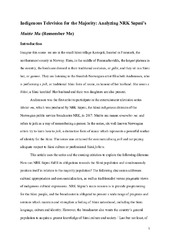Blar i forfatter "Sand, Stine Agnete"
-
‘Call the Norwegian embassy!’: The Alta conflict, Indigenous narrative and political change in the activist films The Taking of Sámiland and Let the River Live
Sand, Stine Agnete (Journal article; Tidsskriftartikkel; Peer reviewed, 2022-03-01)In the 1970s, Norway had not officially acknowledged their Indigenous population, the Sámi. In the following decade, two activist films, Let the River Live (Greve 1980) and The Taking of Sámiland (Eriksen and Tannvik 1984), focused on the Alta conflict ‐ protests against the construction of a power plant in Sámi territory ‐ Indigenous rights and colonial processes. Inspired by discussions concerning ... -
Creative Clusters – Urban Utopia or Regional Remedy? A Nordic perspective on the role of the creative industries in regional development
Sand, Stine Agnete (Journal article; Tidsskriftartikkel; Peer reviewed, 2020-06-07)The creative industries have had a major impact on cultural policy, and it is often argued that these industries can be a vehicle for regional growth. Using regional film production in Norway as a case, I discuss the creative industries, the cluster concept and its impact on policy. I analyse two film policy documents from 2007 and 2015 in order to show how the issue of size and critical mass is an ... -
Dealing with racism: Colonial history and colonization of the mind in the autoethnographic and Indigenous film Sami Blood
Sand, Stine Agnete (Journal article; Tidsskriftartikkel; Peer reviewed, 2022-03-29)This article explores how Sami Blood (2016), as an Indigenous film, addresses colonialism and its consequences. Sami Blood documents historical injustice, shame and how colonialism is internalized by the colonized, and mechanisms of systemic and individual racism. Based on analyses of the film, reviews and perspectives on colonialism and cinema, it is argued that Sami Blood contributes to ... -
How should the non-Indigenous speak? A discussion of decolonizing academia, positioning, and freedom of speech
Sand, Stine Agnete (Journal article; Tidsskriftartikkel; Peer reviewed, 2023-07-06)How can we engage in Indigenous research that allows multiple perspectives and knowledge production that is open to epistemic diversity? Answering calls for decolonization of the academy and the need for researchers to do their homework, I use my position as an ‘inbetweener’ in a Sámi, Indigenous context, experiences with peer reviewers as gatekeepers, and theoretical and methodological discussions ... -
Indigenous journalism, media innovation, and social change A review of previous research and call for more critical approaches
Sand, Stine Agnete; Rasmussen, Torkel; Ní Bhroin, Niamh (Journal article; Tidsskriftartikkel; Peer reviewed, 2021-03-01)Indigenous journalism can facilitate the inclusion of Indigenous voices in the public sphere, thereby contributing to social change. Contemporary Indigenous journalism is in part facilitated by the introduction and diffusion of paradigmatic media innovations, including the Internet, mobile technology, and social media. Based on a literature review, we investigate how media innovations are ... -
Indigenous Television for the Majority: Analyzing NRK Sápmi’s Muitte Mu (Remember Me)
Sand, Stine Agnete (Journal article; Tidsskriftartikkel; Peer reviewed, 2019-06-21)This article asks, “How can indigenous media fulfill its obligations toward the indigenous population while also connecting with the majority?” In the entertainment television series Muitte mu, produced by the indigenous public service broadcaster NRK Sápmi in Norway, famous Norwegian artists learn to joik, a Sámi form of music. Muitte mu triggered a discussion concerning cultural appropriation and ... -
‘Northern, not Nordic noir’: A Norwegian case study on crime series and strategies for transnational television
Sand, Stine Agnete; Vordal, Thomas (Journal article; Tidsskriftartikkel; Peer reviewed, 2021-06-01)This article discusses transnational television and what strategies public service broadcaster NRK Drama has pursued to make the Norwegian crime series Monster: Brutally Far North travel. Monster was the first Norwegian-language television series bought by a major American cable network, Starz. Using the concept of production values, we argue that NRK has made a series that is able to ride the Nordic ... -
Regional screen ecosystems at the peripheries: Production and talent development in Tromsø and Aarhus
Chow, Pei Sze; Sand, Stine Agnete (Preprint; Manuskript, 2020)This article addresses the regionalisation of screen culture in Norway and Denmark, focusing on how regional screen entities in Tromsø and Aarhus are working to professionalise production and talent development at the peripheries of both countries. We outline their distinctive characteristics and circumstances as regional hubs and delineate the key actors that constitute the respective screen ... -
Small places, universal stories. Diversity, film policy and the geographical dimension of filmmaking
Sand, Stine Agnete (Journal article; Tidsskriftartikkel; Peer reviewed, 2019)This article examines approaches to cultural diversity in a global- local axis. Can one talk about local cultural diversity in a film industry that is increasingly global? Cultural diversity is a goal in European film policy and an important rationale behind the support of European films. Geographical location is a key factor when discussing filmmaking because of the assumption that film and television ...


 English
English norsk
norsk







